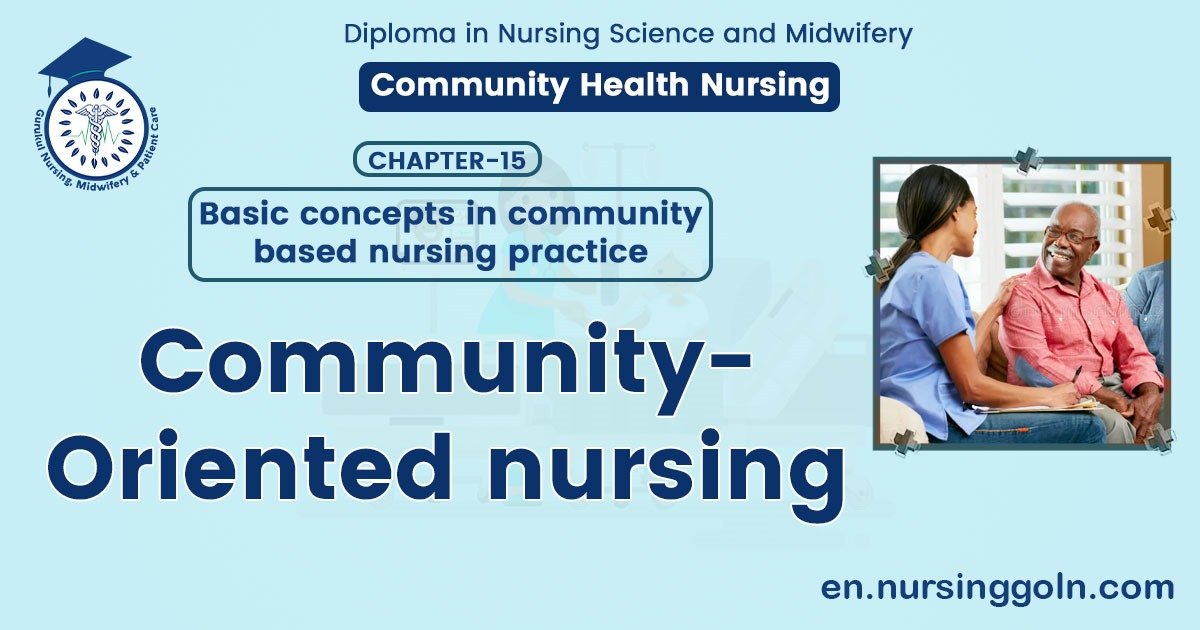Community oriented nursing – This book covers the entire syllabus of “Community Health Nursing” prescribed by the Universities of Bangladesh- for Basic and diploma nursing students. We tried to accommodate latest information and topics.
This book is examination friendly setup according to the teachers’ lectures and examination’s questions. At the end of the book previous university questions are given. We hope in touch with the book students’ knowledge will be upgraded and flourished. The unique way of presentation may make your reading of the book a pleasurable experience.

Community oriented nursing
Concepts
The role of community health nurses focuses on the prevention of illness, injury or disability, the promotion of health and maintenance of health populations. Community health nurses wear many hats while conducting day to day practice. Although performing traditional nursing skills (e.g. administering injections, taking vital signs, changing dressings) in the role of “direct care provider” is still an integral part of nursing practice, the importance of other roles is increasing.
Community-oriented nursing
Community-oriented nursing is nursing that has as its primary focus the health care of either the community or a population of individuals, families, and groups.
Community-oriented practice
Community-oriented practice is a form of care in which the nurse provides health care after doing a community diagnosis to determine what conditions need to be altered so that individuals, families, and groups in the community to stay healthy.
Roles of Community health Nurses
Eight major roles of nurses in providing community health nursing are:
1. Care provider
2. Educator
3. Advocator
4. Manager
5. Collaborator
6. Leader
7. Counselor
8. Researcher.
1. Care Provider : The most familiar role of the community health nurse is that of clinician or care provider, the provision of nursing care takes on new meaning in the context of community health. The direct care provider role involves the direct delivery of care. Performing tasks or skills typically associated with nursing practice (e.g. client assessment, taking vital signs, medication administration, changing dressings, and inserting catheters etc) is the essence of the role of direct care provider.
The clinician role in community health means that the nurse ensures that health services are provided not just to individual and families but also to groups & population. It IS important that nurses recognize the difference in emphasis on roles in the various setting.
The care provider role in population-based nursing also requires skills in collaborations with consumers & others professionals, use of epidemiology and biostatistics, community organization and development, research, program.
2. Educator Role : A second important role of the community health nurse is that of educator or health teacher. Although health education is an important role for nursing in acute care settings, it is often the most significant role of the nurse working in community settings. Teaching individuals, families, and groups about maintenance of health, threat to health, and relevant lifestyle choices that affect health is integral in all community settings. Additionally the nurse must evaluate the learners’ level of understanding accurately and reinforce it accordingly.
3. Advocate Role : Nurses act as client advocates in all settings. In the community settings, the nurses’ role as an advocate is vital. Because they often work with vulnerable populations, nurses in community settings serves as client advocates constantly
Advocacy goals : There are two underlying goals in client’s advocacy-
a) To help clients gain greater independence or self- determination. The community health nurse act as an advocate for the clients by showing them what services are available, die one’s to which they are entitled& how to obtain them.
b) To make the system more responsive and relevant to the needs of the clients. By calling attention to inadequate, inaccessible or unjust care, community health nurses can influence change,
Advocate action : The advocate role incorporates four characteristic action-
- being assertive
- Taking risk
- Communicating & negotiating well and
- Identify resources and obtaining results.
4. Manager Role : Nursing care in both hospital and community settings involves management of the nurse’s time, limited resources other personnel, and program organization and coordination, as well as the management of the client’s care. The management role includes planning, organizing coordinating, marketing, controlling, and evaluating care and care delivery.
5. Collaborator Role : Community health nurses seldom practice in isolation. They must work with other health providers to deliver the most comprehensive effective, cost-conscious care possible. Similarly health promotion interventions need to be collaborative. As a member of health team community health nurses assume the role of collaborator, which mean to work jointly with others in a common endeavor, to cooperate as partners.
The community health nurse’s collaborator role requires skills in communicating, in interpreting the nurse’s unique contribution to the team, and in acting assertively was an equal partner. The collaborator role also may involve functioning as a consultant.
6. Leadership Role : Leadership refers to the ability to influence the behavior of others. In community settings, the community health nurse may assume the role of a leader with clients and their families, other health care providers, public officials, local leaders, or employers. As a leader, the nurse may work with others to identify and assess threats to health and to intervene to remove or lessen these threats.
Community health nurses are becoming increasingly active in the leadership role, separate from leading within the manager role. As leaders, community health nurses seek to initiate change that positively affects people’s health. They also seek to influence people to think and behave differently about their health and the factor contributing.
7. Counselor Role : A nurse m the role of a counselor listens to clients and their families, encourages them to explore issues and options, and enables them to manage their personal situations. Assistance with identification of problems and possible solutions and guidance through the problem-solving process are functions of nurses in most community-based settings.
8. Researcher Role : In the researcher role, community health nurses engage in systematic investigation, collection, and analysis of data for solving problems and enhancing community health practice. Research is an investigative process in which all community health nurses, can become involved in asking questions and looking for solutions. In the role of research findings for merit and applicability to practice and should determine care accordingly.

Roles of Community Health Workers
The roles and activities of community health workers’ (CHWs) are tailored to meet the unique needs of their communities. They also depend on factors such as whether they work in the healthcare or social services sectors. Generally, CHWs hold the following roles:
1. Creating connections between vulnerable populations and healthcare systems
2. Facilitating healthcare and social service system navigation
3. Managing care and care transitions for vulnerable populations
4. Determining eligibility and enrolling individuals into health insurance plans
5. Ensuring cultural competence among healthcare professionals serving vulnerable populations
6. Educating health system providers and stakeholders about community health needs
7. Providing culturally appropriate health education on topics related to chronic disease prevention, physical activity and nutrition
8. Advocating for underserved individuals to receive appropriate services
9. Collecting data and relaying information to policymakers to inform policy change and development
10. Providing informal counseling, health screenings, and referrals
11. Building capacity to address health issues

The specific role of CHWs in rural health programs is dependent on:
Services provided through the program, such as:
- Advocacy
- Outreach
- Education
- Clinical services
Required CHW skills, such as:
- Communication
- Cultural competence
- Training
- Professional experiences
- Education
See More:
